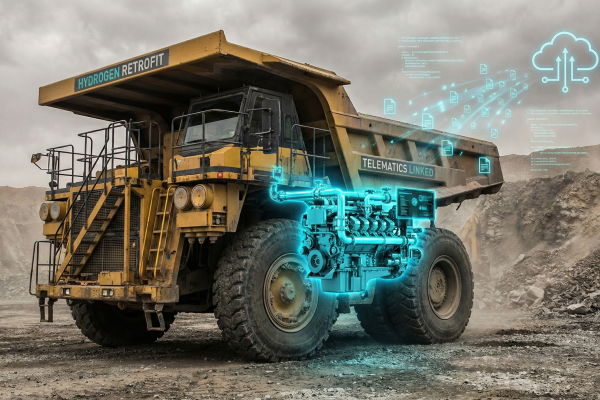September 4th, 2023 | 07:10 CEST
E-car skepticism and charging station farce: BMW, BYD, dynaCERT
"Is it wise (…) to promote only this one technology without having access to essential battery raw materials?" BMW CEO Oliver Zipse recently expressed a somewhat critical stance towards electromobility in an interview with Handelsblatt. While BMW plans to launch the 'New Class' electric vehicles from 2025 onwards and take the lead in technology, even the BMW CEO acknowledges the strong competition from China. Let's look at what the automotive future could look like and where opportunities may be lurking.
time to read: 3 minutes
|
Author:
Nico Popp
ISIN:
BAY.MOTOREN WERKE AG ST | DE0005190003 , BYD CO. LTD H YC 1 | CNE100000296 , DYNACERT INC. | CA26780A1084
Table of contents:

"[...] dynaCERT's HydraGEN™ device offers a retrofit solution for diesel engines designed to protect the environment while providing economic benefits. [...]" Bernd Krueper, President & Director, dynaCERT Inc.
Author
Nico Popp
At home in Southern Germany, the passionate stock exchange expert has been accompanying the capital markets for about twenty years. With a soft spot for smaller companies, he is constantly on the lookout for exciting investment stories.
Tag cloud
Shares cloud
BMW: Charging stations throughout Europe, even in remote regions?
The disparity between aspiration and reality in electromobility is evident, as demonstrated by the farce surrounding the mere eighty charging stations at the West Trade Fair parking garage during this year's IAA Mobility automotive exhibition - significantly more charging stations would be needed to meet demand. Even BMW CEO Zipse recently expressed skepticism as to whether we will be able to power all e-vehicles even in remote regions of Europe by the mid-2030s. While the European auto industry still seems to be struggling with the phase-out of the internal combustion engine, the Chinese are pulling away, at least in the world's most important car market, with electric vehicles. BYD, in particular, is now considered the top dog and is increasingly pushing into the European market.
At this year's IAA, the Chinese presence will be greater than ever before. As Handelsblatt recently wrote, the Chinese are not only successful in the exhibition halls: the Chinese brand MG sold 57,000 vehicles in Europe in the first seven months of the year - that is more than Skoda and Seat combined. The growth drivers are e-vehicles, of which there are already more than combustion vehicles in some Chinese cities. Thanks to advanced technology and competitive pricing, BYD, XPeng, Geely and Co. are outpacing the competition from VW, Mercedes and BMW. While European manufacturers are countering this trend and announcing their own innovation offensives, competing with the powerful Chinese manufacturers in their home market will be difficult.
BYD: Success planned for the long term
However, there is much to suggest that dominance in the world's largest submarket is a crucial key to taking off internationally as well. Economies of scale are also likely to play a significant role for automakers. The supply of raw materials is also crucial. BMW CEO Zipse sees the success of BYD and Co. as the result of a long-term planned strategy that encompasses the entire value chain of electric vehicles - from battery raw materials to the finished vehicle. European manufacturers are at a disadvantage in this regard due to a lack of government support.
dynaCERT: Heavy machinery and hydrogen as a beacon of hope
Given the problems expressed by industry representatives, investors should not disregard alternatives to electric vehicles. While the pendulum seems to have finally swung in the direction of electromobility, at least for passenger vehicles, there are still millions of internal combustion engine vehicles on our roads. The Canadian company dynaCERT has spent years trying to make the many diesel engines more climate-friendly. Its core product is HydraGEN, a conversion kit that uses hydrogen to help reduce diesel engine fuel consumption and emissions by up to 19%. After not achieving significant sales success in recent years, dynaCERT has shifted its focus more strongly on the business-to-business customers. Here, HydraGEN now seems to be gaining traction - already last year, there were some orders from mining companies who are retrofitting their heavy and expensive machinery. In parallel, dynaCERT has also entered the hydrogen production business with its partner Cipher Neutron.**
Here, too, the success stories have been mounting in recent weeks. Both companies recently announced their collaboration with the raw materials company Strategic Resources. The goal is to equip one of the company's processing plants with electrolysers. "After many years of due diligence and negotiations on the BlackRock project, dynaCERT is very pleased to congratulate its partner, Cipher Neutron, and Strategic Resources on the completion of their collaboration agreement to study the implementation of CN's AEM electrolysers for Strategic Resources. The province of Quebec and Hydro Quebec are a particularly suitable area for the deployment of Cipher Neutron's green hydrogen technology, given the abundance of green electricity in the region," commented Jean-Pierre Colin, VP at dynaCERT, on the collaboration.
Despite the Company's operational progress, dynaCERT's stock has not had a hot summer - on the contrary, after an initial jump from new orders, the price gradually declined. The market is still trying to decide whether the numerous new orders will translate into strong figures. As soon as the new orders materialize, the share price will likely react. Nevertheless, the share is not for the faint of heart - dynaCERT is always good for surprises. The uncertainty of whether electromobility will be able to establish itself in all areas in the coming years opens up additional prospects for the speculative stock.
Conflict of interest
Pursuant to §85 of the German Securities Trading Act (WpHG), we point out that Apaton Finance GmbH as well as partners, authors or employees of Apaton Finance GmbH (hereinafter referred to as "Relevant Persons") currently hold or hold shares or other financial instruments of the aforementioned companies and speculate on their price developments. In this respect, they intend to sell or acquire shares or other financial instruments of the companies (hereinafter each referred to as a "Transaction"). Transactions may thereby influence the respective price of the shares or other financial instruments of the Company.
In this respect, there is a concrete conflict of interest in the reporting on the companies.
In addition, Apaton Finance GmbH is active in the context of the preparation and publication of the reporting in paid contractual relationships.
For this reason, there is also a concrete conflict of interest.
The above information on existing conflicts of interest applies to all types and forms of publication used by Apaton Finance GmbH for publications on companies.
Risk notice
Apaton Finance GmbH offers editors, agencies and companies the opportunity to publish commentaries, interviews, summaries, news and the like on news.financial. These contents are exclusively for the information of the readers and do not represent any call to action or recommendations, neither explicitly nor implicitly they are to be understood as an assurance of possible price developments. The contents do not replace individual expert investment advice and do not constitute an offer to sell the discussed share(s) or other financial instruments, nor an invitation to buy or sell such.
The content is expressly not a financial analysis, but a journalistic or advertising text. Readers or users who make investment decisions or carry out transactions on the basis of the information provided here do so entirely at their own risk. No contractual relationship is established between Apaton Finance GmbH and its readers or the users of its offers, as our information only refers to the company and not to the investment decision of the reader or user.
The acquisition of financial instruments involves high risks, which can lead to the total loss of the invested capital. The information published by Apaton Finance GmbH and its authors is based on careful research. Nevertheless, no liability is assumed for financial losses or a content-related guarantee for the topicality, correctness, appropriateness and completeness of the content provided here. Please also note our Terms of use.




